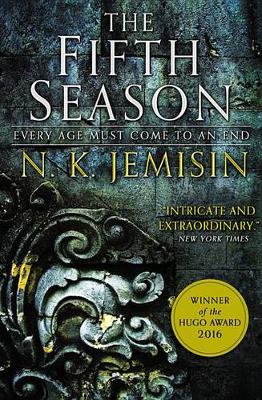Reviewed by inlibrisveritas on
The story is told from three perspectives: Damaya, Syenite, and Essun. All three are women who are considered Orogenes, those that can feel the earth beneath them and manipulate it as easy as they breathe. Each of these perspectives is incredibly different in tone giving us a pretty wide view on what it’s like for an Orogene in The Stillness (the world they live in). Each of these women is at different stages in life with different connections, and it just adds so much to the story to see how each one responds to oppression, abuse, and family. It’s truly difficult to pick a favorite perspective because each one adds something vital to the story and they work together to create this much wider picture slowly but surely over time.
The style of the story is where I think most people will have issues, and admittedly I did at first when I attempted this solely in print. Essun’s perspective is told in 2nd person, which is something rarely attempted in books, and you are placed into her story directly. It’s kind of bizarre at first, but I think it served to really add a level of emotion that I’m not sure would be there otherwise. We get a sense of how orogeny feels and how Essun struggles with her personal identity and loss. There is also the matter of world-building, which is done based on what our characters know themselves with the rare exceptions of the interludes which give you just a touch more than you should know. As a result we don’t get a clear picture of the planet’s history and culture surrounding Stonelore, because most of the characters we spend a lot of time with either don’t know the answers or keep them heavily guarded. This reads like a post-apocalyptic book set on our own Earth, which is never explicitly stated but I think kind of adds a level of wonder to the story. How did it get to this point? Why has the world and it’s people changed so much?
The audio version of this book is absolutely excellent! While the print copy has a very helpful glossary of terms that I think is worth a little extra money to have on hand, I think the audio version is the way to go. Robin Miles the narrator, who I listened to for the novella Binti, does such an amazing job! She has an excellent range of voices and some fantastic pacing.
For a book that has such an iffy start it quickly became one I didn’t want to put down. I’m super excited to move onto The Obelisk Gate and see just where these characters’ stories lead us, because after the intense ending it would be impossible not to continue onward.
Reading updates
- Started reading
- 26 November, 2018: Finished reading
- 26 November, 2018: Reviewed
